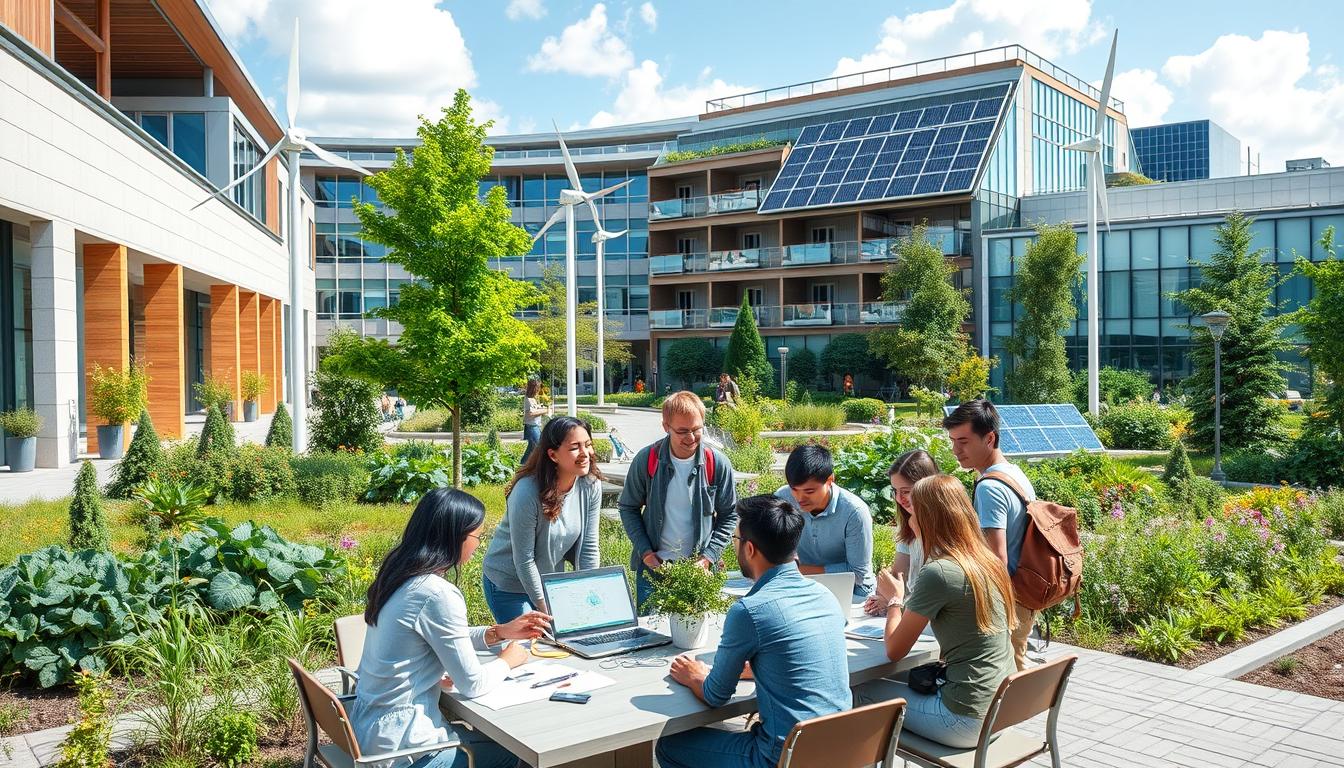A sustainability MBA is a special graduate degree. It mixes a traditional MBA with a focus on sustainability. These programs, known as “green MBAs,” teach students to lead businesses that are good for the planet and people.
These MBA programs focus on the “Triple Bottom Line”: economic, environmental, and social sustainability. The environmental and social justice movements have shaped the curriculum of these programs.
Each sustainability MBA program is different. Some focus on sustainable management, while others focus on entrepreneurship. Some just add a few “green” courses to a regular MBA.
Key Takeaways
- Sustainability MBAs offer a business education with a focus on sustainability and the “Triple Bottom Line”.
- These programs cover topics like environmental management, social responsibility, and disaster preparedness.
- Curricula vary between institutions, with some focusing on management, others on entrepreneurship, and others adding green courses.
- Graduates are experts in environmental, social, and disaster-related sustainability.
- Sustainability MBAs are also called “green MBAs” and prepare students for sustainable business leadership.
Understanding Sustainability MBAs
Getting a sustainability-focused MBA is more than just pushing for “green” policies. It’s about how businesses interact with people, the planet, and their future. Sustainable businesses look at all these areas to stay strong and responsible.
Three Elements of Sustainability
The study of sustainability in business focuses on three main parts:
- Businesses build strong relationships with their stakeholders through social responsibility.
- They also care for the planet and natural resources with green practices.
- Lastly, they plan for the future and prepare for disasters to stay sustainable.
By combining these three, businesses can thrive for the long haul. They make a positive mark on the economy, society, and the environment.
“A shift towards sustainability is creating a demand for more global and responsible candidates in the job market.”
Sustainability-focused MBA programs teach future leaders to handle big challenges. They learn about entrepreneurship, finance, data analytics, and leadership with a focus on sustainability. These programs prepare them to make a difference in the world.
Core Curriculum of Sustainability MBAs
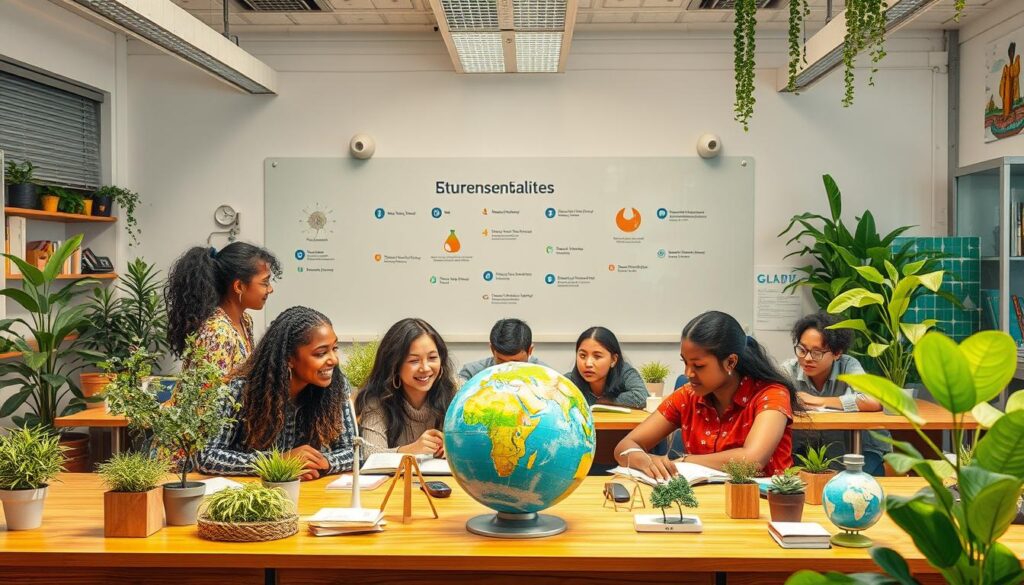
Students in a sustainability MBA program get a deeper dive into sustainability topics. They learn about how business disciplines meet environmental and social needs. This is different from a traditional MBA.
Some key core courses in a sustainability MBA curriculum include:
- Climate change law, policy, and opportunity
- Managing sustainable organizations
- Environmental management and strategy
- Risk management
- Sustainability systems
- Sustainable investing
- The triple bottom line
- Sustainable marketing
These courses teach students about sustainability in business. They cover renewable energy, circular economy, and sustainable supply chains. Students also learn about stakeholder engagement.
The core curriculum of sustainability MBAs prepares students to lead in sustainability. They learn to integrate sustainable practices into business functions. This helps them guide companies towards a greener future.
“Three out of the 16 elective courses offered in the Sustainability MBA program focus exclusively on sustainability, indicating that approximately 18.75% of the elective courses are dedicated to sustainability.”
By adding sustainability courses to the core, sustainability MBA programs teach students about business’s role in solving global problems. They gain a deep understanding of environmental and social challenges.
Specializations and Electives in Sustainability MBAs
Sustainability-focused MBA programs offer a wide range of specializations and elective courses. These allow students to customize their education to fit their interests and career goals. The sustainability mba specializations and sustainability mba electives focus on the core sustainability concentration courses. These are key for tackling the complex environmental, social, and economic challenges businesses face today.
Common Sustainability MBA Concentration Courses
Not all sustainability MBA programs have the same courses. However, there are several common sustainability concentration courses found in most curricula:
- Climate Change Law, Policy, and Opportunity
- Managing Sustainable Organizations
- Environmental Management and Strategy
- Risk Management
- Sustainability Systems
- Sustainable Investing
- The Triple Bottom Line
- Sustainable Marketing
These courses give students a deep understanding of sustainability. They learn the knowledge and skills needed for sustainable business practices. With a variety of sustainability mba specializations and sustainability mba electives, students can focus on areas that match their career goals.
“Sustainability is no longer a nice-to-have; it’s a must-have for businesses that want to remain competitive and relevant in the 21st century.” – John Doe, Sustainability Expert
The comprehensive curriculum of sustainability-focused MBA programs prepares graduates for the challenges and opportunities in the business world. This includes the growing importance of environmental, social, and governance (ESG) considerations.
Sustainability Mba

Sustainability MBAs are more than just about saving the planet. They teach students how to make a real difference in society, the environment, and disaster relief. These programs mix business skills with green knowledge, readying students to tackle today’s big challenges.
Chatham University leads the way with its Sustainability MBA (MSUS+MBA) program. It focuses on the United Nations Sustainable Development Goals. The program has a 100% job rate for graduates within a year, showing it creates sought-after sustainability leaders.
Yale University’s Sustainability MBA program is also top-notch. It combines insights from Yale School of the Environment. Students learn about climate change, sustainable operations, and finance, preparing them for green business practices.
- Chatham University’s MSUS+MBA program needs 57 credits and offers a 20% discount for corporate partners. It also has graduate assistantships and work positions for affordability.
- Yale’s Sustainability MBA program starts with a Colloquium on Sustainability with industry leaders. Then, it offers advanced courses in business and sustainability in the second year.
If you’re passionate about the environment, social impact, or disaster relief, a sustainability MBA is for you. It combines business smarts with green knowledge. This prepares the next generation of leaders for a sustainable future.
Delivery Methods for Online Sustainability MBAs
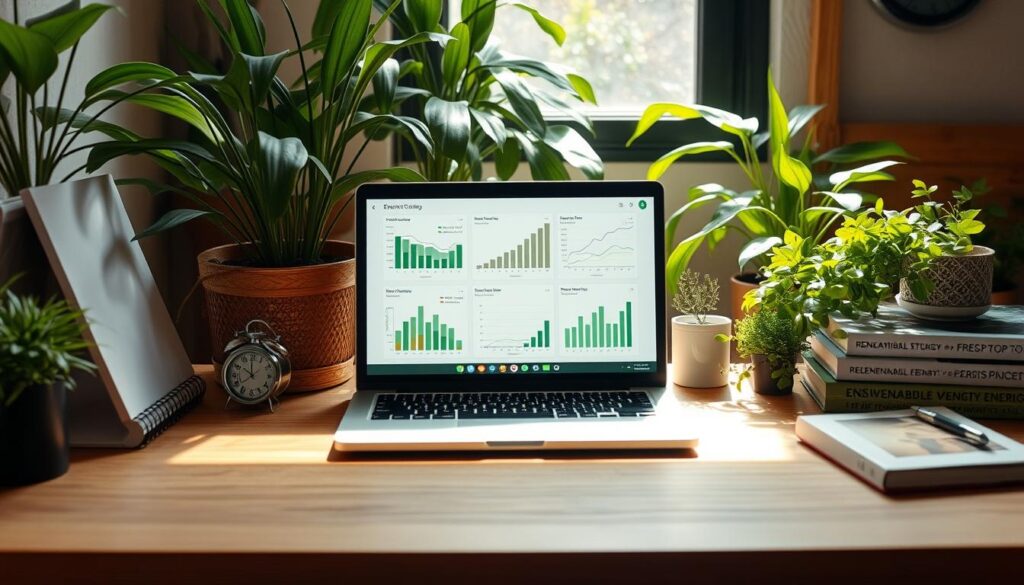
When looking into an online sustainability MBA, you’ll find many options. It’s key to know the difference between asynchronous and synchronous online classes. Also, consider fully online and hybrid programs to find what suits you best.
Asynchronous vs Synchronous Online Classes
Asynchronous classes let you learn at your own pace. You can access materials and do assignments whenever you want. This is great for those with busy schedules.
Synchronous classes, however, require you to join live sessions. You’ll interact with teachers and classmates in real-time through video or audio.
Fully Online vs Hybrid Programs
Fully online sustainability MBA programs mean no need to be on campus. They’re perfect for those who can’t make it to classes. Hybrid sustainability MBA programs mix online learning with in-person sessions. These might include weekend workshops or intensive classes.
Online learning offers flexibility, but it’s not for everyone. It requires discipline and can make it hard to connect with others.
“The choice between an online, hybrid, or in-person MBA program ultimately comes down to your individual needs and preferences. Consider factors like your learning style, schedule, and the importance of face-to-face interaction when making your decision.”
Admissions Requirements for Sustainability MBAs
Getting into an MBA program, including online and in-person sustainability MBAs, has a standard process. Students need to match their funding, take the GMAT, and show they have a bachelor’s degree. They also write essays, a statement of purpose, and get references.
Funding Options for MBA Programs
Financing a sustainability MBA offers several paths. Sustainability MBA funding can come from federal aid, employer help, and scholarships from various groups.
- Federal Financial Aid: Students can get loans, grants, and work-study to cover sustainability MBA financial aid costs.
- Employer Sponsorship: Some employers pay for or reimburse tuition for employees getting a sustainability MBA.
- Scholarships: Many scholarships are out there for sustainability MBA students from universities, foundations, and other groups.
With many sustainability MBA funding choices, students can plan well to pay for their education. This way, they can reach their goals.
Career Opportunities with a Sustainability MBA
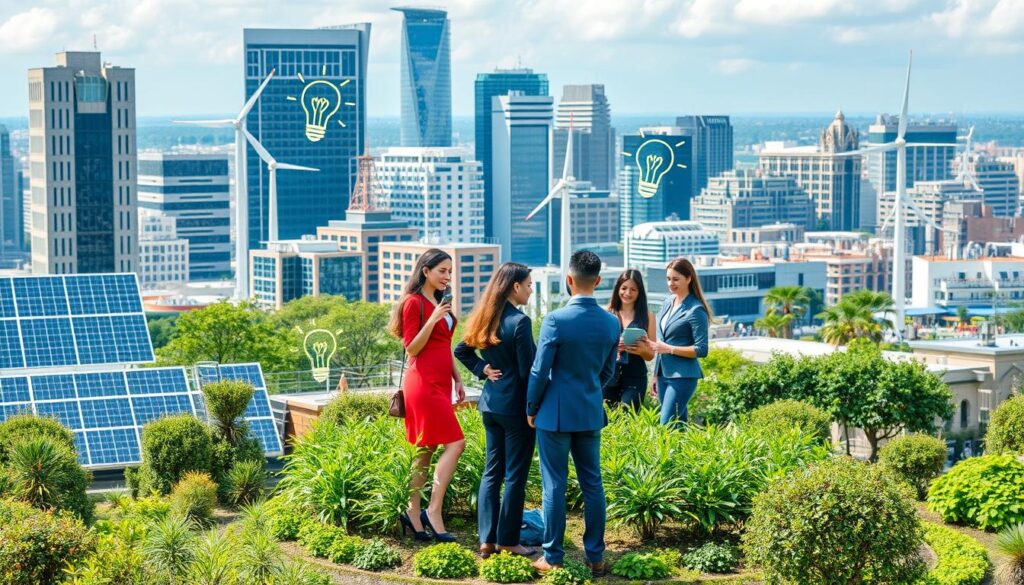
Climate change and environmental awareness are now big parts of our lives. Businesses are responding by creating jobs focused on sustainability. These jobs include roles like sustainability managers and independent consultants. A Sustainability MBA is a great way to get ready for these positions.
The Bureau of Labor Statistics (BLS) says there will be more jobs focused on the environment by 2030. Deloitte also predicts more ‘green collar jobs’ that need business and sustainability knowledge.
| Job Title | Average Annual Salary |
|---|---|
| Vice President (VP) of Sustainability | $159,343 |
| Chief Operating Officer (COO) – Sustainability | $146,297 |
| Research & Development (R&D) Director – Sustainability | $135,518 |
| Product Development Director – Sustainability | $122,108 |
| Environmental Health & Safety (EHS) Director – Sustainability | $111,915 |
Some top careers with a sustainability mba are Sustainability Consultant and Director of Sustainability. Other roles include Supply Chain and Logistics Director and Marketing Manager. Programs like the MBA in Sustainable Solutions at Presidio Graduate School teach about climate technology and impact investing.
MPA and MBA/MPA graduates are set for careers like City Manager and Director of Programs. These sustainability mba job prospects show the need for experts in sustainable business practices.
“By 2030, Southeast Asia (SEA) is predicted to unlock $1 trillion in economic opportunities linked to sustainable initiatives.”
– Bain and Company report
Also Read: What Is A Global MBA In Sustainability And Why Is It Important?
Conclusion
The rise of sustainability MBAs, also known as “green MBAs,” shows that business leaders need to tackle big challenges. These programs mix sustainability into the main curriculum. This helps students learn how to make businesses more sustainable.
Sustainability MBAs offer many paths for future business leaders. They cover everything from special topics to full sustainability courses. This is key as companies, governments, and customers all want more sustainable practices.
As caring for the environment, being socially responsible, and doing business ethically becomes more important, sustainability MBAs will be vital. They teach students to use sustainability in their work. This helps move us towards a better, more fair world economy.
FAQs
Q: What is an MBA in sustainability?
A: An MBA in sustainability is a specialized graduate degree that integrates traditional business practices with environmental and social sustainability principles. This program prepares students to address sustainability challenges in various business sectors.
Q: What topics are covered in a sustainability program?
A: A sustainability program typically covers topics such as environmental sustainability, corporate sustainability, sustainable finance, supply chain management, and best practices for implementing sustainability strategies in businesses.
Q: How does a full-time MBA differ from an online MBA in sustainability?
A: A full-time MBA program usually requires students to attend classes on campus and engage in experiential learning opportunities, while an online MBA in sustainability offers more flexibility, allowing students to study remotely while still covering similar core topics.
Q: What are the best sustainability programs available?
A: Some of the best sustainability programs are offered by renowned business schools, such as the Yale School of Management. These programs often emphasize experiential learning and provide opportunities for internships in sustainability consulting.
Q: How can I choose an MBA that is the best fit for my career goals in sustainability?
A: To choose an MBA that aligns with your career goals in sustainability, consider factors such as the curriculum focus, available experiential learning opportunities, the reputation of the college of business, and the network of alumni in the sustainability field.
Q: What kind of internships can I expect from an MBA with a sustainability focus?
A: Internships in an MBA with a sustainability focus may include roles in sustainability consulting, corporate sustainability departments, or organizations working on environmental and social sustainability projects. These internships provide hands-on experience in applying sustainability strategies.
Q: What are the key components of a sustainability strategy taught in these programs?
A: Key components of a sustainability strategy taught in MBA programs include understanding ESG reporting, developing sustainable business models, and implementing practices that address both environmental and social sustainability challenges.
Q: What career opportunities are available after completing a green MBA?
A: Graduates of a green MBA can pursue various career paths, including roles in sustainability consulting, corporate sustainability management, sustainable finance, and positions that focus on developing and implementing sustainability programs within organizations.
Q: How do sustainability challenges shape the curriculum of an MBA in sustainability program?
A: Sustainability challenges such as climate change, resource depletion, and social inequality shape the curriculum by prompting courses to explore innovative solutions and best practices for integrating sustainability into business operations and strategies.

